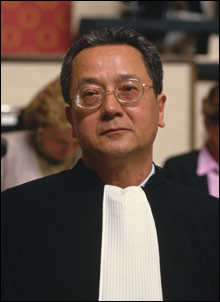
THE FACE OF EVIL? Schroeder is fascinated, but is that all? |
“He couldn’t be a terrorist, living in a cellar and eating canned food,” says a perceptive friend of the notorious French attorney Jacques Vergès. “He needs his books. He’s an egghead,” says another friend.For decades, even as he’s led the zesty bourgeois life of a gourmand and a Parisian intellectual, Jacques Vergès has made a living defending bomb-wielding revolutionaries, from Algerian independence fighters to members of Germany’s Baader-Meinhof group to Carlos the Jackal. As seen in Barbet Schroeder’s documentary L’avocat de la terreur|Terror’s Advocate, which plays this week (November 9-15) at the Brattle Theatre, Vergès makes no pretense of barristerial objectivity. Going to trial as mouthpiece for two unrepentant German terrorists, he announced, “I won’t hide the esteem I feel for both of them.”
Vergès’s ardent support for violent left-wingers isn’t even the most controversial thing about him. This is the same man who’s stood up in court for numerous African dictators, and for Yugoslavian strong guy Slobodan Milosevic. In 1984, he defended Gestapo commandant Klaus Barbie, “the Butcher of Lyon.” Although the Nazi deported thousands of French Jews, Vergès smiles nostalgically about having been there for Barbie. “It was exhilarating. Thirty-nine lawyers on the other side, me alone. Each day, the others wondered, ‘What ploy will the bastard come up with?’ ”

His major strategy was a dilly: he did everything he could to steer the proceedings away from Barbie and toward France’s occupation of Algeria. If French soldiers tortured and murdered countless Algerian prisoners (and they did), what right did those who acted like Nazis have to accuse an actual Nazi of similar crimes? Barbie received a life sentence, dying later in prison. At one point in the documentary, Vergès brags that nobody he’s defended has ever been executed.
I wonder whether he’d have maintained his unblemished record if he’d been the advocate of his pal Pol Pot. In the early ’40s, they were college mates in France. In the ’70s, years when Vergès disappeared from view, he seems to have visited Pol Pot in Cambodia. This is the Khmer Rouge leader responsible for murdering two million of his citizens, the worst Holocaust since World War II. Not according to Vergès, who admits that some bad things did happen in the killing fields but holds that the Cambodian genocide, if there was a genocide, was “unintentional.”
What does Barbet Schroeder think of Vergès, who speaks smugly and comfortably before the filmmaker’s camera? (He might remind you of Robert McNamara reminiscing chummily with Errol Morris about Vietnam in The Fog of War.) Schroeder’s point of view isn’t very clear. We know from the films he’s made about Idi Amin and Barbie that he’s fascinated with the faces of evil. Is that preoccupation enough?
Vergès needs to be challenged. And there’s a second problem: L’avocat de la terreur gets bogged down in political events that those who aren’t professional 20th-century-Europe historians will remember dimly, if at all.
Does Buffalo need more to put it on the map than red-peppered chicken wings dunked in blue cheese and eaten with a hunk of celery?
Recently discovered documents have led to a new claim for the unfashionable, oft-snowbound city: America’s first permanent movie theater, it seems, opened there, the Vitascope Hall, on October 19, 1896. The businessmen geniuses behind it were not the Marx Brothers but the brothers Mark — Mack and Moe.